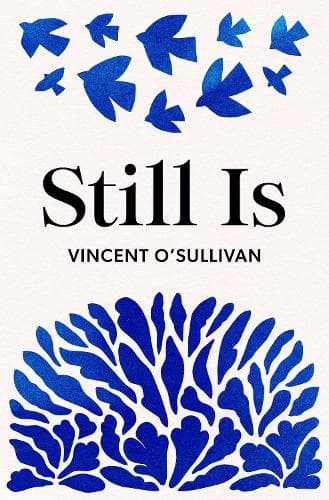Review — Still Is, by Vincent O’Sullivan
Reviewed by James Norcliffe
That Sir Vincent O’Sullivan’s latest collection of poetry has been published less than two months after his death gives reading the book a particular poignancy. Of course, the eminent, perhaps preeminent, Aotearoa / New Zealand poet, novelist, playwright, critic, editor and biographer had what could be described as ‘a good innings’ and Vince himself, being fond of colloquialisms, would no doubt have concurred: eighty-six years, the highest accolades his nation could bestow, and a vast bibliography. Vincent O’Sullivan’s literary career was long and glittering.
Still Is has an added poignancy because so many of the poems would have been written with the poet knowing that his end was not far away. Given this however, there is no sense of doom in the work. The poems are marked with O’Sullivan’s indelible signature: they are wry, witty, with conversationalist titles and tone belied by the layered irony and all but subterranean passion. An O’Sullivan poem is unmistakably his. Perhaps, too, it is unrealistic to have anticipated that O’Sullivan would have dwelt on his personal circumstances, for he was not a confessional poet. He often remarked that the anecdotes, characters, and conversations in his poetry were made up, fictive. He spells this out in Under duress, as seldom happens (p93), the first poem in the final section where he talks about, “getting away with such as you can in poetry”.
… I’ve written about… animals I’ve not encountered,
conversations I attribute with conviction
which – why should it surprise you? – were
made up on the spot. It’s the gift I have.
No way of checking. My gulling the reader…
Maybe. O’Sullivan is being a little disingenuous. When the goyim Frank, in Bernard Malamud’s The Assistant, asks Helen what she is reading, and Helen responds, “It’s a novel”, Frank says, “I’d rather read the truth,” Helen replies simply: ‘It is the truth.’
And this is so often the truth in O’Sullivan’s poems. The Venezuelan boy in The boy at the dump is clearly imagined, but the oranges brought home are real.
There are occasional suggestions of memento mori: No choice much, any longer (p51) with its leaves falling too fast and ending with its paper with the edges charred; and in Three ohs and cold lino (p88) there is the commodious tumbril – the more the merrier, but these are no more than you would expect, and the latter poem has a jaunty exuberance underlined by its metrical pattern.
Like all great poets, Vincent O’Sullivan notices things. He invests these with significance: the way a country gate is opened compared with the way it is closed, the absence of God’s teeth in a work of art, a butterfly out of season. Such things are worth considering, the poet says, and so we consider them.
The final section of the book’s four sections is rather more elegiac and seems to be something of a summing up, an envoi if you will, to a rich career in poetry, and here death is more directly addressed, particularly in For the obituarist (p101) and in Nothing too serious, mind you (p100):
Funny old business, dying,
funny as being born.
Funny as fuck not being able to sleep
when all you can do is yawn.
The final poem in the book would appear to be a personal ars poetica and these are its concluding lines:
Yet the tangle of lines we so love, the sort of gifting
us space. Space that is never elsewhere,
only ours to entice. Out-tangling fact let’s call
it. What flings from here.
Still Is may be the last poems of an old man, but there is no falling away between its covers. On the contrary, the book is an exhilarating ride, full of dazzling poems with their characteristic sidesteps, foot trips, the always surprising lurch from the vernacular to erudition, from “Jesus Murphy!” to Aquinas, and always the “perfected attention” that Robert Kelly defined as craft. Still Is is an eloquent testament to what we have lost.
Reviewed by James Norcliffe
